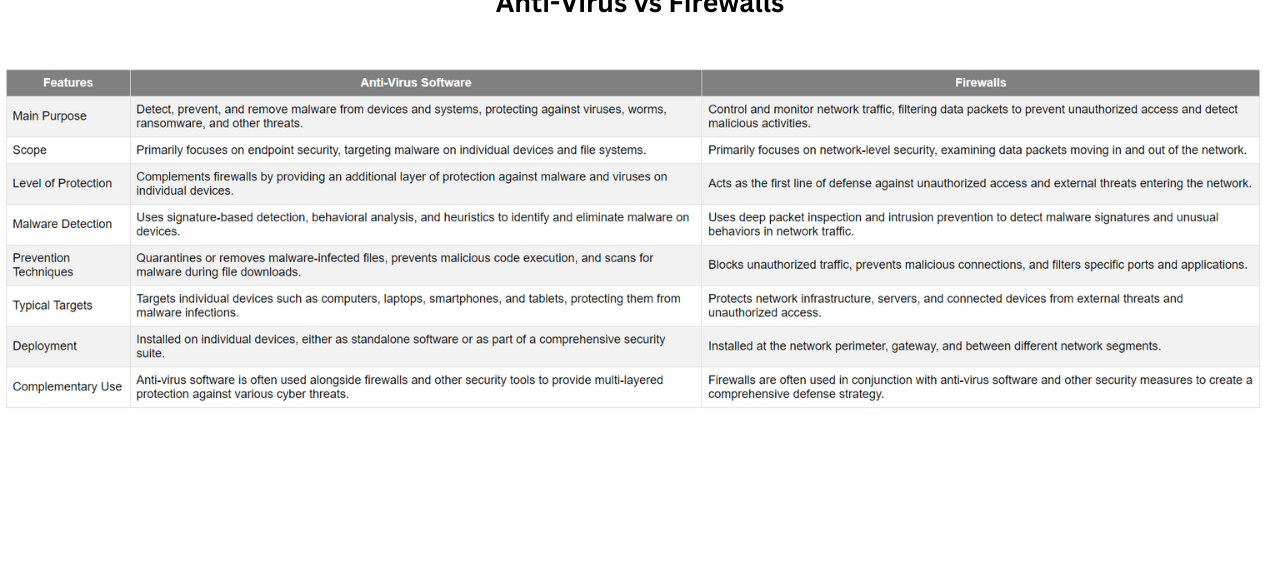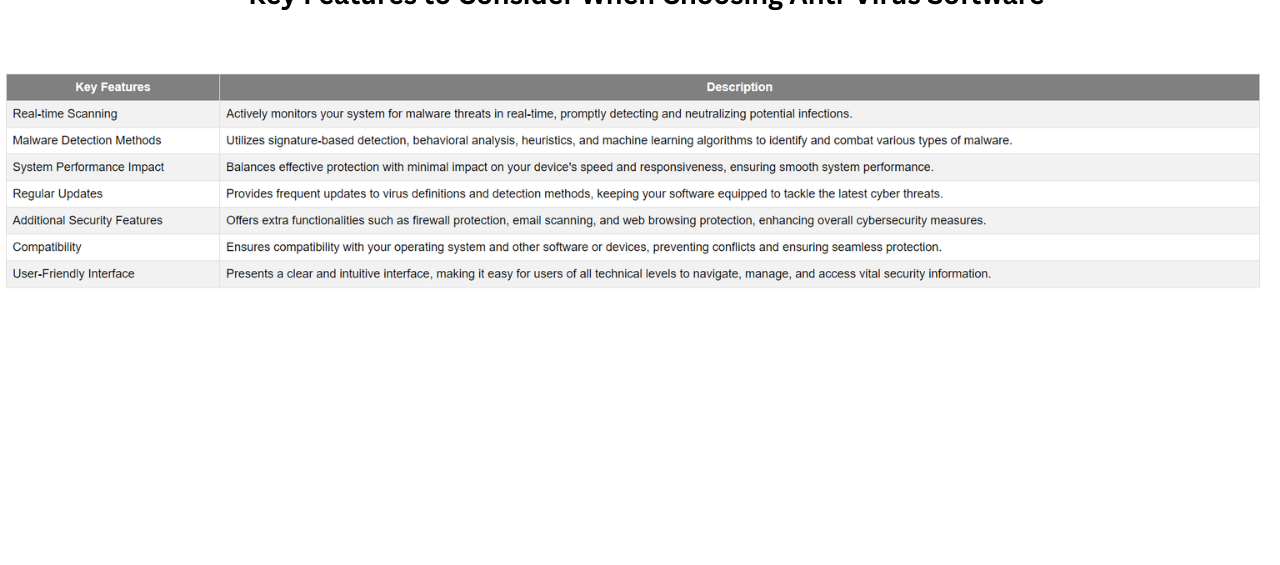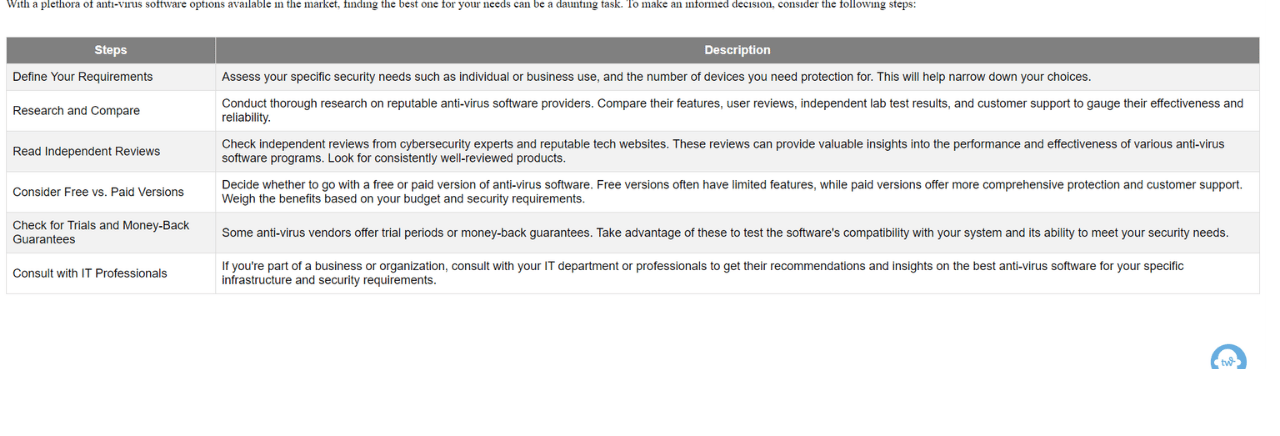

Anti-Virus Software:
Malware Detection & Prevention
In an ever-evolving digital landscape, where cyber threats loom large, protecting our valuable data and personal information has become more critical than ever before. Malicious software, commonly known as malware, continues to grow in sophistication, making it imperative for individuals and organizations to invest in robust anti-virus software. This article aims to provide a comprehensive guide to selecting the best anti-virus software ensuring that your digital world remains secure and safeguarded against potential threats.
Understanding Anti-Virus Software
Anti-virus software, or anti-malware software, is a vital tool designed to detect, prevent, and remove malicious software from computers and other digital devices. These programs work by utilizing a combination of signature-based detection, behavioral analysis, and heuristics to identify and combat various types of malware, including viruses, worms, Trojans, ransomware, spyware, and more. The primary goal of anti-virus software is to protect your system from infections and thwart cyber-attacks that may lead to data theft, financial loss, and system damage.
Comparative Chart
*For Full View of Image, Click to Download.
Key Features to Consider (Chart)
*For Full View of Image, Click to Download.
Chart: Selecting the Best Anti-Virus Software
*For Full View of Image, Click to Download.
With a plethora of anti-virus software options available in the market, finding the best one for your needs can be a daunting task. To make an informed decision, consider the following steps:
Conclusion
Selecting the best anti-virus software is a crucial step in safeguarding your digital world from malicious cyber threats. Consider the features that matter most to you, such as real-time scanning, malware detection methods, system performance impact, regular updates, and additional security features. Through thorough research, reading independent reviews, and understanding your specific security needs, you can make an informed decision that provides robust protection for your devices and valuable data. Remember, investing in reliable anti-virus software is an essential step towards maintaining a secure and worry-free online experience.
Frequently Asked Questions (FAQ)
Q: What is anti-virus software and why do I need it?
A: Anti-virus software is a specialized program designed to protect your digital devices from various forms of malicious software commonly known as malware. This software is crucial for safeguarding your personal and sensitive data, preventing cyber-attacks, and maintaining the overall health of your system.
Q: How does anti-virus software work?
A: Anti-virus software uses a combination of techniques to detect and combat malware. It employs signature-based detection, behavioral analysis, and heuristics. In addition, it sometimes machine learning algorithms to identify and neutralize threats before they can cause harm to your system.
Q: Can I rely solely on free anti-virus software?
A: While some free anti-virus software can provide basic protection, they often lack advanced features and customer support found in paid versions. For robust protection and comprehensive features, consider investing in a reputable paid anti-virus solution.
Q: How often should I update my anti-virus software?
A: Regular updates are crucial for effective protection against the latest threats. Ideally, your anti-virus software should update its virus definitions and detection methods automatically in real-time. However, you should also check for manual updates regularly to ensure your software remains current.
Q: Will anti-virus software slow down my computer?
A: The impact on system performance varies among different anti-virus software. While some programs are designed to have minimal impact on performance, others might consume more system resources. Look for software that strikes the right balance between protection and performance.
Q: Can I use multiple anti-virus programs simultaneously for added protection?
A: Running multiple anti-virus programs at the same time can lead to conflicts and performance issues on your system. It is not recommended to have more than one active anti-virus program installed. Instead, consider supplementing your anti-virus software with other security measures like firewalls and regular software updates.
Q: Can anti-virus software protect against all types of cyber threats?
A: While anti-virus software is essential for protecting against a wide range of malware, it is not a foolproof solution against all cyber threats. It is crucial to practice safe online behavior, avoid suspicious links and downloads, and implement other cybersecurity best practices in conjunction with using anti-virus software.
Q: Do I need anti-virus software on my mobile devices?
A: Mobile devices are also susceptible to malware attacks, especially when downloading apps from unofficial sources. Investing in mobile-specific anti-virus software can add an extra layer of protection to your smartphone or tablet.
Q: Is it necessary to have anti-virus software on a Mac?
A: While macOS is generally considered more secure than some other operating systems, it is not immune to malware attacks. Having anti-virus software on your Mac can help protect against Mac-specific threats and prevent your device from spreading Windows-based malware to other devices.
Q: What should I do if my anti-virus software detects a threat?
A: If your anti-virus software detects a threat, follow its instructions to quarantine or remove the infected files. Additionally, ensure your software is up-to-date and run a full system scan to ensure there are no other infections lurking on your device.
Remember, choosing the right anti-virus software and staying informed about the latest cyber threats are crucial steps towards maintaining a secure digital environment. By being proactive and investing in reliable protection, you can defend yourself against potential cyber-attacks and enjoy a safer online experience.






